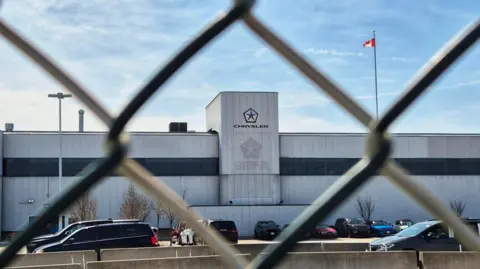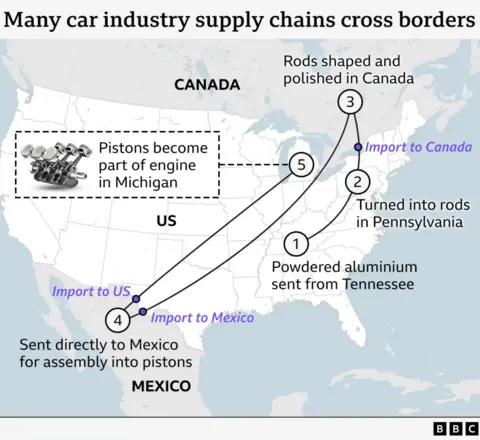Canadian workers on edge as car plant hits pause over US tariffs
 Ali Abbas Ahmadi/BBC
Ali Abbas Ahmadi/BBCFear and anxiety are running high in Windsor, Ontario, after carmaker Stellantis announced it will temporarily shut down its assembly plant in the Canadian border city next week as a result of US President Donald Trump's car tariffs.
Derek Gungle, who is among the 4,500 people employed at the plant, says the temporary pause in operations was "kind of expected".
Still, he tells the BBC he worries about what's to come.
It is a feeling that is echoed across Windsor, the heart of Canada's automobile sector and just a bridge away from the US state of Michigan. For decades, the two regions worked together across the shared US-Canada border to build some of North America's most popular cars, like the Ford F-150.
Those working in Windsor's auto sector who spoke to the BBC on Thursday say they are worried about the days ahead now that the US has implemented a 25% tariff on all "foreign-made" vehicles. For Canada, that tariff will be reduced by half for cars that are made with 50% US-made components or more.
"It's absolutely terrifying," says Christina, who has worked at the Ford plant in Windsor for 25 years. She says she fears her plant will also shut down like Stellantis.
She has four children – one of whom is in university. Her youngest is 12. "I would like them to have a good life too," Christina says as tears well up in her eyes.
Responding to this building anxiety among Canadians, Prime Minister Mark Carney announced that Canada will hit back with its own tariffs.
Like the US, Canada will slap a 25% tariff on American-made cars sold in Canada. Vehicles that were produced in compliance with the existing North American free trade agreement between Canada, the US and Mexico, will face lower taxes, with the tariff applying only to the non-Canadian components of the car.
Unlike the US, Canada will not be applying its tariffs on automotive parts.
"The government will be responding by matching the US approach," the prime minister told reporters on Thursday.
The Canadian government will also work to exempt auto producers from these tariffs if they choose to maintain their production and investment in Canada, Carney said.
On the campaign trail, federal leaders of Canada's major parties proposed their own solutions.
Conservative leader Pierre Poilievre called for the removal of federal tax on new Canadian-made cars, which he argued would increase demand for them, while New Democratic Party leader Jagmeet Singh proposed the idea of selling "Victory Bonds" to Canadians to build up Canada's economy amid the ongoing trade dispute with the US.
North America's car manufacturing sector is highly integrated, with a car crossing the US-Canada-Mexico borders multiple times before it is assembled and ready to be sold.
For example, some Ford F-150s have engines that are built in Canada with electronic parts manufactured in Mexico, and are then assembled in either Michigan or Missouri.
Stellantis' shutdown announcement on Thursday affects workers in all three countries. Not only did the company halt operations at its long-standing Windsor plant (what used to be the Chrysler plant) for two weeks, it also paused production at its Toluca, Mexico, plant for one month and laid off 900 workers in the US.

For Canada, the price is steep. The country sells almost all of its produced cars - 93% - to the US market, amounting to around 1.6 million vehicles. The car parts it manufactures for vehicles assembled south of the border are also now subject to a 25% US tariff.
Car prices going up for consumers is a likely outcome, says Mahmood Nanji, the Lawrence Centre Policy Fellow at Western University's Ivy Business School and a former associate deputy minister at the Ontario Ministry of Finance.
Even with a lower 12.5% tariff applied on Canadian-made cars with US parts, Mr Nanji predicts that it would add about $8,000 (£6,110) to the price of a Chevrolet Silverado.
"Dealers are going to have a hard time selling those vehicles, and consequently, demand may very well slow down," he says, adding that this would have significant impacts on both sides of the US-Canada border.
The tariffs will also be an "administrative nightmare", says Mr Nanji, as companies and border security officials try to work out how these tariffs will be applied in North America's enmeshed auto sector.
Auto workers in Windsor, like Chad Lawton, say they hope these levies are temporary and that Canada and the US could negotiate a deal, "so we don't end up in a situation that's going to lead to mass layoffs".
But Mr Lawton says he also believes that Canada must stand up for itself, and that it "cannot just concede and roll over and allow it to happen".
- Live updates: Markets and reaction to Trump tariffs
- Full list: See all Trump tariffs by country
- Watch: Why Trump's tariffs aren't really reciprocal
- Chris Mason: Yet another example of colossal, upending change
- Voices: Americans react to the president's trade policy
- Explainer: What are tariffs, and why is Trump using them?
